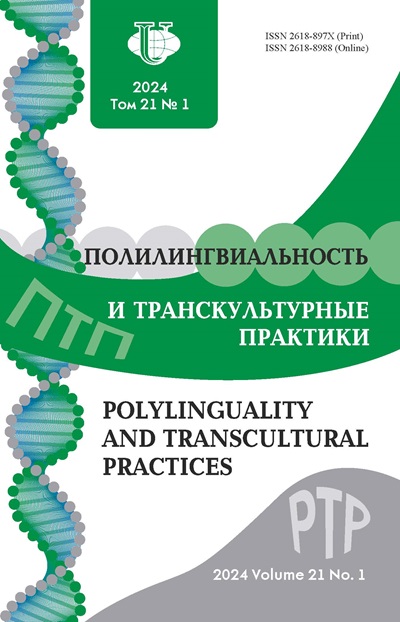Issue
Title
Authors
|
Tsoupikova H.V. |
|
Bogdanova K.A. |
|
Grinberg S.A. |
|
Smagulova J. |
|
Todorova I.D. |
|
Romanov Y.A., Solovyova L.V. |
|
Dmitrieva E.G. |
|
Frolkova Y.A. |
|
Baghana J., Gonchukova E.L. |
|
Balykhina T.M. |
|
Il’ina S.S., Bekisheva Y.V. |
|
Medvedeva N.V. |
|
Zaitseva I.P. |
|
Khalilzadeh A.Z. |
|
Avdeeva I.B. |
|
Mekeko N.M. |
|
Ouretski I.G., Lyjina S.M. |
|
Rogova A.V., Fedorenkov A.D. |
|
Odintsova I.V. |
|
Dianova L.P. |
|
Chernyshov M.Y., Zhuravleva A.M., Chernyshova G.Y. |
|
Arkhangelskaya A.L., Zhigunova O.M. |
|
Karpina E.V. |
|
Shmelkova V.V. |
|
Elagina R.I. |
|
Moldanova Z.I. |
|
Mikheeva N.F., Dvoryadkina N.A. |
|
Gishkaeva L.N. |
|
Ivanova A.S., Soboleva N.I. |
|
Kidyamkina S.A. |
|
Kraevskaya N.M. |
|
Vakhrusheva L.V. |
|
Baghana J., Treschova N.V. |
|
Tanwar S., Mital R., Balykhina T.M., Perova T.E. |
|
Kuchukova Z.A., Bauaev K.K. |
|
Dmitryuk N.V., Arynbaeva R.A. |
|
Chernishova E.B. |
|
Nedopekina E.M. |
|
Mikheeva N.F. |
|
Stepanenko V.A., Nahabina M.M., Kurlova I.V. |
|
Chernyshov M.Y., Zhuravleva A.M., Chernyshova G.Y. |
|
Kochai Mir Sahib Jan -. |
|
Mirzoyeva L.Y., Syurmen O.V. |
|
Dorokhova M.V., Sverdlova N.A. |
|
Kalinina V.V. |
|
Razumovskaya V.A., Kononova V.A. |
|
Dzhusupov M. |
|
Molchanova I.I. |
|
Tumanova S.R. |
|
Bondareva O.V. |
|
Dagbaeva O.I. |
|
Chzhan Uebo -. |
|
Kozlovskaya E.S. |
|
Saricheva E.A., Yakushev V.V. |
|
Nedosugova A.B. |
|
Sorokina E.V. |
|
Saranina I.I. |
|
Toursidou N.Y. |
|
Banshchikova М.A. |
|
Nazartseva E.A., Chauzova L.I. |
|
Budiltseva M.B., Varlamova I.J., Novikova N.S. |
|
Voropayeva Y.A. |
|
Nevmerzhitskaya E.V. |
|
Lizunova I.I. |
|
Dunaeva L.A., Apakina L.V. |
|
Mallaeva Z.M., Magomedov M.A., Khalidova R.S. |
|
Baziyeva G.J., Uzdenova F.T. |
|
Osmanzade A.O. |
|
Kyuchukov H., Samko M. |
|
Lavitski A.A. |
|
Antonyuk E.V. |
|
Akhnina K.V. |
|
Baghana J. |
|
Iakovleva S.A. |
|
Ivanova E.N. |
|
Kurilenko V.B., Makarova M.A. |
|
Balykhina T.M., Cherkashina T.T. |
|
Maslova O.V. |
|
Alhasov Y.K. |
|
Orlova E.V. |
|
Novikova N.S., Budiltseva M.B. |
|
Kiynova J.K. |
|
Shevchenko A.V. |
|
Baghana J., Treschova N.V. |
|
Medvedev A.N., Tarasova D.A. |
|
Matalova S.V. |
|
Karpina E.V. |
|
Bozhko E.N. |
|
Lutin S.A. |
|
Danilova M.V. |
|
Gosteva J.N. |
|
Alexeeva I.S. |
|
Zhuravleva Y.A., Agmanova A.E. |
|
Khukhuni G.T., Valuitseva I.I. |
|
Khakuasheva M.A., Kazieva A.M. |
|
Dzhusupov M. |
|
Vinogradova E.N., Klobukova L.P. |
|
Anikina M.N. |
|
Preobrazhenskij S.J., Konovalova D.G. |
|
Debrenne M. |











